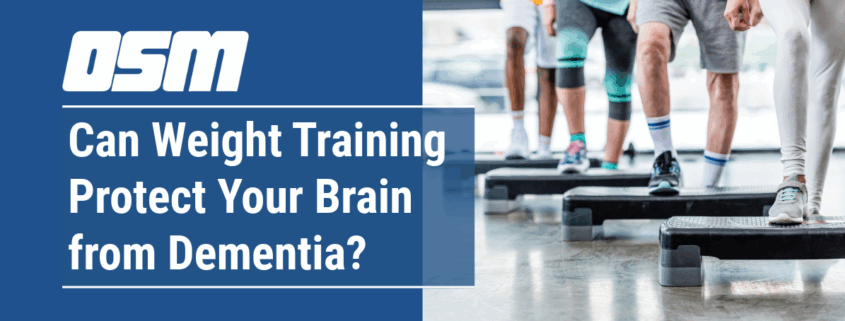Can Weight Training Protect Your Brain from Dementia?
Article featured on MedicalNewsToday
As of 2021, researchers estimate that about 57 million peopleTrusted Source globally were living with dementia — a neurological condition that impacts a person’s memory and thinking skills.
Past studies show there are a number of modifiable lifestyle factors that may help reduce a person’s risk of developing dementia, such as regular exercise both earlier in life and at an older age.
“Dementia affects millions of people worldwide and has a major impact not only on individuals, but also on families and healthcare systems,” Isadora Ribeiro, PhD, a São Paulo Research Foundation (FAPESP) doctoral fellowship recipient at the School of Medical Sciences (FCM) at the State University of Campinas (UNICAMP) in Brazil told Medical News Today.
Why focus on weight training?
For this study, researchers recruited 44 adults ages 55 or older with a diagnosis of mild cognitive impairment.
Study participants were divided into two groups. The weight training group participated in a resistance exercise program with moderate to high intensity sessions twice a week, with progressive loads, meaning weight or sets were increased as participants’ muscles strengthened. The control group did not exercise for the duration of the study.
“We chose to study resistance training because its primary goal is to increase muscle strength, which is especially important in older adults,” Ribeiro explained.
Weight training helps protect certain areas of the brain
At the study’s conclusion, Ribeiro and her team found that after six months, participants in the weight training group showed improvement in verbal episodic memoryTrusted Source and the strength of neurons and areas of the brain associated with Alzheimer’s disease.
Conversely, the control group’s participants showed signs of worsening brain parameters.
“This is an interesting finding because it suggests that weight training may not only help to increase cognition, but also prevent the development of atrophy in regions related to Alzheimer’s disease — potentially delaying progression or even preventing the onset of dementia,” Ribeiro details.
Reversing mild cognitive impairment
Scientists also discovered that five participants in the weight training group no longer had a diagnosis of mild cognitive impairment when they reached the end of the study.
“This suggests that weight training may alter the clinical trajectory of individuals with mild cognitive impairment, shifting them from an increased risk of dementia to preserved cognition by the end of the study,” Ribeiro said.
Strength training offers even more benefits to older adults
MNT had the opportunity to speak with Gary Small, MD, chair of psychiatry at Hackensack University Medical Center in New Jersey and author of numerous books on cognitive health and aging, including the New York Times best seller The Memory Bible, about this study.
“These findings are consistent with previous research in animals and humans showing that strength training improves cognitive abilities,” Small commented. “Most of the previous studies demonstrating the brain health benefits of physical activity have focused on aerobic exercise, and that body of research has been compelling that regular physical exercise increases the volume of brain regions controlling memory and thinking.”
Larger studies in different populations still needed
MNT also talked to David Cutler, MD, a board certified family medicine physician at Providence Saint John’s Health Center in Santa Monica, CA, about this research.
Cutler said he did not find the study’s findings surprising because doctors always recommend patients engage in exercise to help prevent cognitive decline.
“I hadn’t seen any studies specifically looking at resistance training, but that wasn’t a surprise, that it was reinforcing that the things that patients are doing in terms of resistance exercises are most likely helpful,” he continued.
“Anytime people engage in any activity, whether it’s exercise, dietary, supplements, or medications, we want to make sure the benefits exceed the risks. And exercise training, especially for older people, can entail some risk. So these exercises need to be guided by someone to make sure patients don’t incur injuries when they’re doing them,” he underscored.
“I think we want to see (this study) in larger numbers, in both men and women, in people with other medical conditions, to make sure that we’re not putting people at risk when they’re undergoing these types of exercise regimens,” Cutler added.
The Orthopedic & Sports Medicine Center of Oregon is an award-winning, board-certified orthopedic group located in downtown Portland Oregon. We utilize both surgical and nonsurgical means to treat musculoskeletal trauma, spine diseases, foot and ankle conditions, sports injuries, degenerative diseases, infections, tumors and congenital disorders.
Our mission is to return our patients back to pain-free mobility and full strength as quickly and painlessly as possible using both surgical and non-surgical orthopedic procedures.
Our expert physicians provide leading-edge, comprehensive care in the diagnosis and treatment of orthopedic conditions, including total joint replacement and sports medicine. We apply the latest state-of-the-art techniques in order to return our patients to their active lifestyle.
If you’re looking for compassionate, expert orthopedic and podiatric surgeons in Portland Oregon, contact OSM today.
Phone:
Address
17355 Lower Boones Ferry Rd Suite 100A
Lake Oswego, OR 97035
Hours
Monday–Friday
8:00am – 4:30pm



